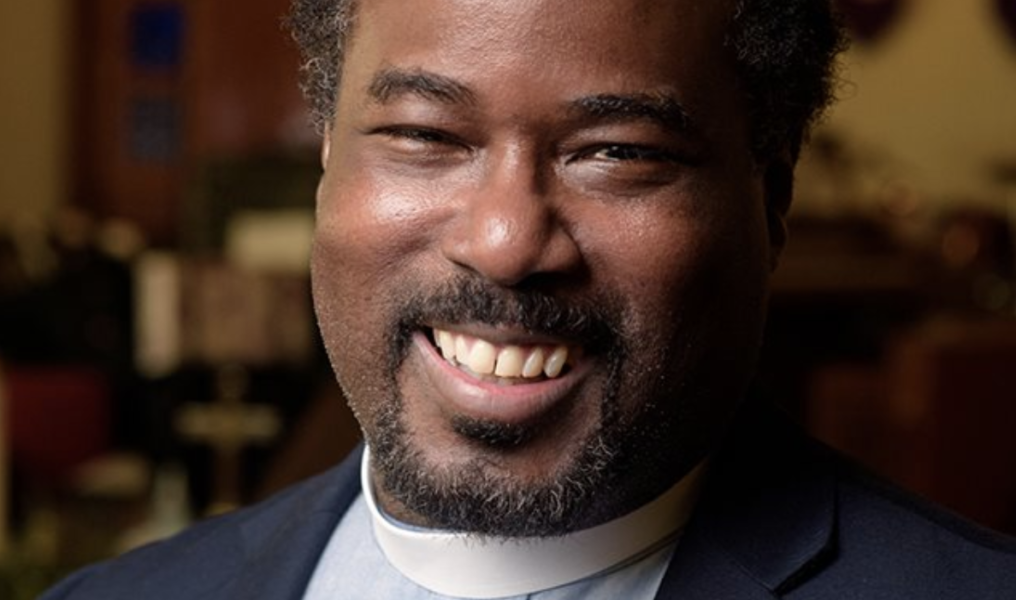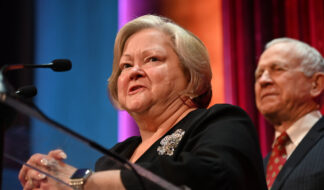Innovation by Necessity
To those visiting MCC Detroit's website for the first time, it might not be readily apparent that things like virtual worship and Zoom videoconference Bible study sessions are brand-new offerings. In fact, just like myriad organizations both religious and secular, Metropolitan Community Church-Detroit has had to adapt quickly in the face of the COVID-19 pandemic.
"God is not confined to a building," the Rev. Roland Stringfellow affirmed, in the address he delivered online from his home office on March 14. Between The Lines spoke with Stringfellow following two Sundays of pre-recorded messages to congregants, archived on the MCC-D website.
"We're still getting people accustomed to going to the internet to watch the service," Stringfellow acknowledged. "Many of our folks aren't tech-savvy. Not to say that they're tech-ignorant, it's just not part of their daily routine."
At the time of the March 14 message, he expressed that MCC-D planned to be back to meeting in person by Palm Sunday, April 5. However, as the coronavirus safety precautions rapidly increased, Stringfellow and his staff soon realized that was not feasible — "simply listening to what the Governor had to say — as opposed to the President." Of learning how to use Zoom, "It wasn't too bad," Stringfellow said.
"I admittedly so, ended up recording my message six different times before I got to the version that I liked the best, where I wasn't looking into the camera, or I wasn't stumbling over words," he said.
He compared it to learning how to preach.
"When you are a new pastor and you're speaking in front of people … you have to work on your eye contact and your connection with the people," Stringfellow said. "And I find that this is also a similar learning curve for me."
But it doesn't end with Stringfellow's weekly address.
"In terms of the Sunday Bible study, that was my way of offering a live connection for our people at the same time our worship service would be," he said. "We doubled our participation in the past week. And I have other friends and colleagues in other states who also joined as well."
Now that they have a national presence, Stringfellow said he's thinking of how to broaden the message beyond the MCC-D community. The church's Connection Groups, regularly scheduled small gatherings that meet for a project or discussion, are up and running using videoconferencing platforms, too.
Out of necessity, MCC-D has had to innovate. Yet given that Stringfellow has been able to markedly expand his reach, we asked whether some of the church's new offerings would remain in place once the COVID-19 restrictions have been fully lifted.
"Absolutely," Stringfellow said. "In fact, our program coordinator … was basically saying, this tragedy that we find ourselves in has really presented an opportunity for us to ramp up our website presence, and even how we communicate clearly with not only our community but the wider community."
He said they have the opportunity to reach beyond those who already attend worship services regularly, and perhaps draw in those who only occasionally attend their social gatherings.
"I think prior to the virus and the isolation, we were doing everything on a daily basis and trying to make ends meet, and now our time is different," Stringfellow said. "I'll put it that way."
Responding to Congregants' Needs
While MCC-D seems to have adjusted their programming very well to present challenges, Stringfellow said the virus has taken an emotional toll on many of his congregants. In the first place, there is the loss of the ability to meet in person, something that the leadership unanimously decided was necessary for the safety of all concerned. And about half of the congregation is over the age of 60 — a group at greater risk for COVID-19.
"How do you weigh those older adults [who] are very vulnerable to this virus, and still, in my opinion, in good conscience, say, 'Oh yeah, come on out, and let's worship together?'" he said. "We just want to protect all of our people no matter what your age or health status. Just stay at home, and we will be the ones to be creative with how to give you the encouragement and worship that you need.
He added that the reason why they worship as a congregation has always been "to support and help people thrive: thrive spiritually, socially, emotionally." Now is no different. But his priority, he said, was to not jeopardize anyone's health. In response to colleagues who might say that God will protect churchgoers from the virus, Stringfellow said, "God is going to be with us, regardless. But that doesn't mean we're invincible. And so, again as a spiritual leader, … we really need to take this very serious in terms of what we are advising people to do."
Stringfellow said the nature of peoples' pastoral needs has changed lately, too. Texts and calls regarding loss of jobs, concern for people they know who have the virus or who have died from it have been coming in. From the beginning, church leadership has been actively reaching out.
"The first two weeks was focused on calling and checking in," Stringfellow said. "'How are you doing? What do you need?' We have a couple of volunteers who will do grocery runs, those sorts of things. We're now realizing our focus will shift on how to help people deal with loss: loss of job, loss of freedom, loss of life or health.
"[For] many of our people, we are their community. Meaning, only community. We are their family, their friends, we're their social connection. And so, it's no surprise, particularly in the LGBTQ community, people don't have family connections," he said. "You can rely upon us. We can support you in that need."
Lessons to Teach, Looking Forward
Despite the struggles many are experiencing, Stringfellow believes that LGBTQ people who survived the AIDS crisis have a lesson to teach the wider public in terms of priorities and perspective.
As with AIDS, "there is this plague/virus and you don't know exactly how it spreads and when it will last and who gets it and who doesn't," Stringfellow said. "The community experienced that and many beautiful lives were lost. But there were a lot of great lessons learned in terms of what's valuable, what's important, what do we put our efforts behind. And I think even in this global pandemic we find ourselves in, there is a lesson … LGBT people can teach to others, in terms of [how] our differences and divisions are becoming less important as we solely focus upon what is really important."
At present, Stringfellow is planning for the upcoming holiday and how to make that as meaningful as possible, given the circumstances. MCC-D anticipates a huge influx of attendees each year for Easter, and this year there will likely be more if the response to online offerings thus far is any indication.
From the time they found themselves unable to meet in person, Stringfellow's instructions to MCC-D's worship planning team has been to focus solely on Holy Week, directing them to include as many elements of the conventional worship service as possible "so people feel like, 'Yeah, this is Easter' or, 'This is Good Friday,'" he said.
"And not just for the sake of the service, but particularly our goal is: How do we help our people make sense of all that's happening during this time and really answer the question: Where is God in all of this?" he said. "I think that is the question we constantly need to come back to, so we're not so focused on a service that people say 'pow' and 'wow' about, but that really the people are walking away with that hope and direction at a time when things are so uncertain."










